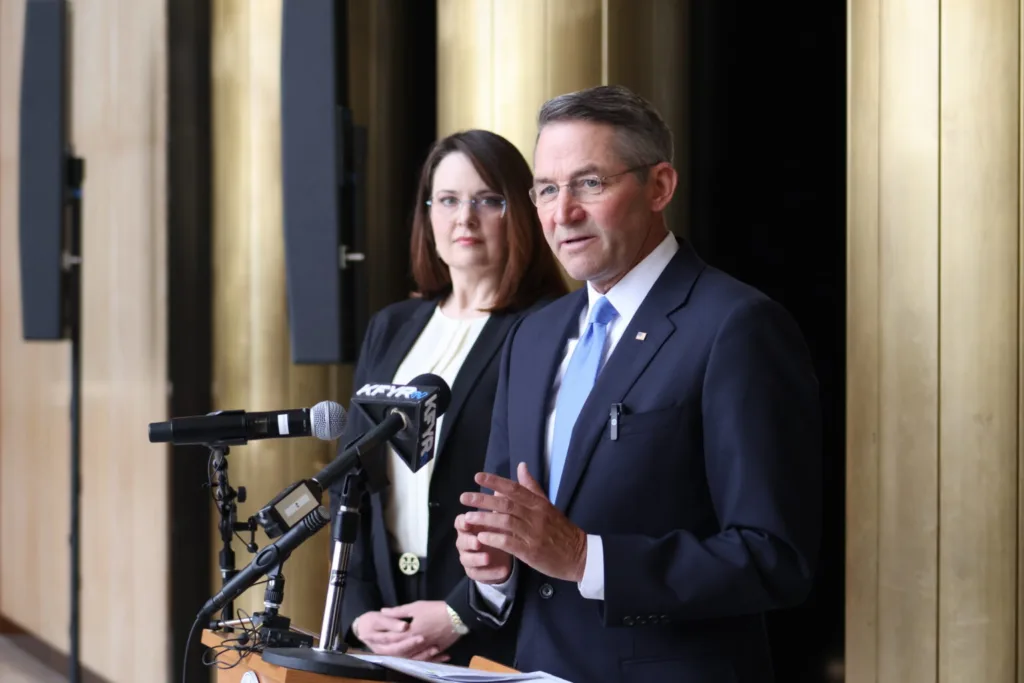

By: Mary Steurer (ND Monitor)
North Dakota’s attorney general said Wednesday Gov. Kelly Armstrong’s veto was “sound,” dismissing a differing conclusion by legislative staff that his intent was unclear and the Legislature should hold a special session to fix the error.
The opinion by Attorney General Drew Wrigley means $35 million for housing programs Armstrong’s office unintentionally crossed out in a May line-item veto can move forward unless the matter is challenged in court or the Legislature reconvenes.
“There’s been a bit of a tempest created in all of it, but what the governor did was a very modest veto,” Wrigley said.
Armstrong’s veto message for the Industrial Commission budget described cutting $150,000 set aside for a Native American-focused organization to fund a homelessness liaison position. But a markup of the bill also crossed out a $35 million appropriation for affordable housing and homelessness — funding Armstrong had intended to leave intact. His office later said there had been a “staff markup error.”
Since then, the Legislature has been trying to figure out what actions, if any, must be taken to address the veto — including the possibility of calling a special session.
Wrigley found that the unintentional markup does not change the substance of the veto because Armstrong’s written veto message was “clear and unambiguous” about what parts of Senate Bill 2014 he intended to cut.
He said in a Wednesday press conference that a “visual image” should not “take precedence over the written orders, the detailed description offered by the one person with the power to veto.”
Attorneys for North Dakota’s legislative branch in a Friday memo took a very different position, advising the Legislature that calling a special session would be the “prudent remedy” for the mistake.
In its memo, Legislative Council said legal precedent suggests the marked-up bill is part of the official veto document.
“It would not be appropriate to allow the Governor and Attorney General to resolve the ambiguity by agreement,” the memo states. Doing so could have unintended consequences for how ambiguous vetoes are handled in the future, Legislative Council said.
Wrigley called the Legislative Council memo a “political document” and said the Attorney General’s Office has the final say on the matter unless the issue is challenged in court.
“The power in question is strictly the governor’s power and it has to be in compliance with the constitution and laws of North Dakota,” he told the North Dakota Monitor last week. “That’s the only assessment here. There’s no role for this in Legislative Council. They have no authority in this regard.”
Armstrong, whose office requested the opinion, in a statement agreed with Wrigley’s findings.
“We appreciate the Attorney General’s determination, which clarifies the matter, avoids the cost of a special session and nullifies the flawed interpretation that initially blew this up into something much bigger than it needed to be,” he said.
A special session is estimated to cost $65,000 per day, Legislative Council has said.
The Legislature could still decide to reconvene for a special session to override the veto if it chooses to, Wrigley said.
Senate Majority Leader David Hogue, R-Minot, said he disagrees with the attorney general’s conclusions.
He said legislative leadership and Legislative Council will meet with the governor’s office to discuss next steps.
“I don’t want there to be uncertainty about these issues,” he said.
The interim Legislative Management Committee would have to vote on whether to challenge the opinion in court.
Legislative Council Director John Bjornson said the office did not immediately have a statement on the opinion.
The bill takes effect July 1.
This story was updated.